Portland has been at the cutting edge of traffic design for many years. In America, with our stringent, car-centric traffic design guidelines, that means having engineers who are not afraid to push the boundaries of the status quo.
The most recent example of this are Portland’s colored bike boxes. We weren’t the first city to do them, but we were the first to launch several of them at once on busy intersections in the urban core.
Before laying them down, PDOT sent an official “Request to Experiment” to the Federal Highway Administration. It’s not a required step, but an official nod from the FHWA would help PDOT breathe a little easier, and more importantly, would open the door to make colored bike boxes a standard treatment that could then be adopted more easily in other cities.
Back in July, we reported that the FHWA responded to PDOT by requiring them to test some of the bike boxes without the color.
PDOT has complied with this request and has installed several bike boxes without the green, thermoplastic paint the initial ones had. One of the non-colored locations is at Broadway and Hoyt in Northwest Portland. Here’s how it looks.
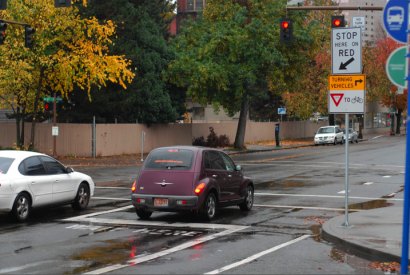
For comparison, here’s how a colored bike box works (this one is at Madison and Third):
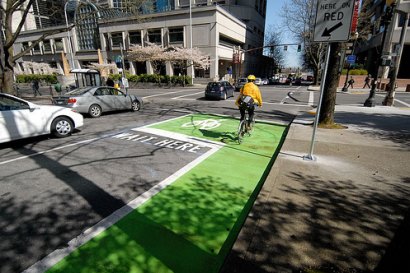
To me, it seems clear that the color adds an important visual cue and that it is an imperative measure for increasing the safety and effectiveness of bike boxes. I hope the FHWA agrees.
(Note: PDOT is also working with Portland State University’s Initiative for Bicycle and Pedestrian Innovation on a bike box research study funded by the Oregon Transportation Research and Education Consortium. More info on that study here.)




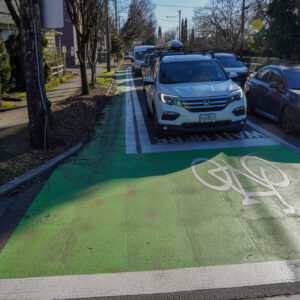
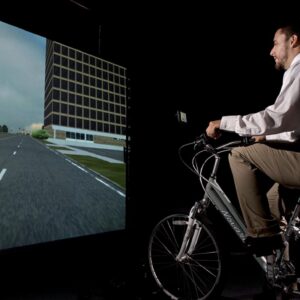
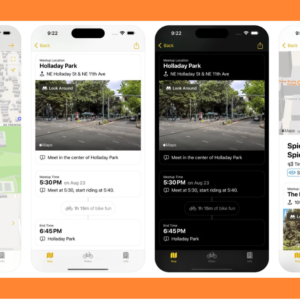
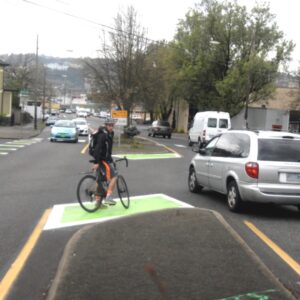
Thanks for reading.
BikePortland has served this community with independent community journalism since 2005. We rely on subscriptions from readers like you to survive. Your financial support is vital in keeping this valuable resource alive and well.
Please subscribe today to strengthen and expand our work.
Jonathan, your photos say it all. Do you have anecdotal thoughts about the relative effectiveness while you waited to shoot your pics?
I’ve definitely noticed the difference in how cars act. The box at the bottom of Broadway as you come off the Broadway Bridge by the post office is not colored. Often cars don’t obey that box – turn right on red, don’t stop, etc. But the other boxes along Broadway as I climb it seems (maybe falsely?) that drivers are much more aware of the potential for a bicyclist in that area.
While I certainly prefer the green ones, I figure it’s worth noting that up close, one of my non-cycling family members thought the green thermoplastic looked ugly.
As for me, I’ll take the green any day.
I agree that the green is much easier to see.
However, as a fair test, perhaps your green photo should be done again when wet to give an apples to apples comparison.
The green might be ugly, but it’s also highly visible. I regularly bike by 3 of the green bike boxes and I’ve never seen a problem with compliance.
oops… Hit submit too soon…
Great photos Jonathan!
If they thought it was ugly, at least that means they noticed it. Baby steps.
The green -or any vivid hue-has my vote.
Here in the Beav there’s one spot I know of (Hall Street) painted blue. When I first rode there my thought was that drivers would mistake that for a turn buffer, but engineering studies show safety here improved dramatically after being painted. In my own observation it’s one of the few intersections I don’t see drivers regularly use as a turn lane. Frankly I prefer the green over the blue, but have been told this type of paint is less slippery when wet.
I’d sure love to see the lane painted at the corner of Murray and Allen in front of RiteAid! Pretty please!
In all the years that the (unpainted) bike boxes on SE Clinton at 39th have been in place, I’ve rarely seen drivers stopped behind the box. By contrast, I’ve rarely (if ever?) seen drivers stopped in the green bike boxes. Too bad it takes so much thermoplastic to make the point, but if that’s what it takes, it’s worth it.
On a somewhat related note but still tangential note, it always bugs me when cars encroach on crosswalks. But I’ve noticed that there’s usually a traffic sensor partway in the crosswalk, which seems to reinforce the message to drivers that if they want to trip the light, they have to pull into the crosswalk. What about if traffic engineers installed those sensors far enough back from the crosswalk to make it so that a car stopped in the crosswalk is too far forward to trip the light?
I never see cyclists using the box at Broadway and Hoyt. Even when I’m the first bike at the light and I pull into the box, others just stack up along the curb. Maybe green is important for bike compliance as well?
I hope they paint the one on SW Terwilliger and SW Taylors Ferry down the road from me. I was bumbed when they didn’t paint it green.
And to think, they did it all without taxing the sale of a single bike….
Go Green!
Imagine how many intersections they’d be able to paint with the excise tax …
Go Infrastructure!
I see a car in the bike box at 3rd an Madison at least once a week on my commute to work. Not bad, but still. Totally oblivious. Without the color I think I’d be seeing more, though.
I like how noticeable the green is.
I just noticed on my ride home today that the green that was painted in the bike on Terwilliger headed North where the I5 freeway entrance paces over the bike lane, has crumbled into little sandy chunks, spilling out everywhere on the road. Anyone else notice this at other spots where the green is painted?
I knew about the variance in boxes, but I think a lot of people have seen the green ones and assume that the ones that don’t have the color aren’t finished yet, and therefore aren’t effective until they are finished.
Of course, it’s kinda hard to lay green down over a white bicycle graphic and still expect to see it, but I don’t think most people notice things like that.
Has the “study” been finished, and has the FHWA told PDOT fill them in now, or is FHWA still waiting to see if they can kill one of us?
The Third and Madison photo was taken when the light was green. I don’t think this counts as a study.
The bike boxes I saw in EU were used to allow cyclist to make left turns.
If the cyclist is going straight they stay to the right.
There’s one component in EU that is missing here and makes all the difference to the successful functioning of the bike box and the improved traffic flow. That’s the advanced green for bicyclists only. This allows the bikes making the left turn and those going straight to clear the intersection unimpeded by autos.
I must admit, that I used to drive through the one on 39th and Clinton regularly. I stopped at the line, but it seemed to me, at the time, that I could go ahead and turn right on a red anyway. Obviously with more publicity since the inception of that first one, I understand them now. But what about folks from out of town? Color is key. It would have drawn my attentiveness to a higher level.
Great!
They certainly fixed the problem of right turning trucks turning right on “green” and killing cyclists in their mandatory bike path!!!!
p.s. I’m too stupid to fully understand anything!!!!
#11 theo, you’re right!
that’s my route in the morning. And, until this little thread, I’ve always thought that the bike box was unfinished!
As a roadway engineer I’ve got some pretty particular thoughts on this. I do think the green (or some other color) is key to visually distinguishing the space of the bike box. The only real way to measure this type of thing is through scientific observation though. It would be a fairly simple matter to count cars at these locations for a few days and estimate the percentage of compliance for each condition. It wouldn’t surprise me to hear that PDOT is, or has plans, to do that.
k
As a roadway engineer please tell me how this box would prevent the types of crashes that have killed folks in Portland?
A truck is approaching the intersection on a green signal, slows, signals and turns right killing a cyclist.
How is the bike box going to help that?
“How is the bike box going to help that?”
tim,
i’m not an engineer (I just play one on TV). seriously though, no roadway engineering measure will prevent people from getting killed or injured.
the bike boxes increase awareness that bikes are present and they help create a bit of breathing room on the road for vulnerable users.
they are not magic. we all must continue to use caution in all circumstances.
one other thing.. i regret not included it in the story initially, but PSU’s IBPI research center is doing a study on the bike boxes.
http://www.ibpi.usp.pdx.edu/bikebox.php
I think Tim is right to question the effectiveness of bike boxes. It appears that they may reduce the potential for motorists turning right from a stop from hitting a cyclist, but Tim asks about the moving truck turning right.
I have witnessed near collisons on Hawthorne at 7th and at 11th – both locations with bike boxes. At 7th, a Trimet bus simply decided to turn right and forced its way across the bike box even with a continuous string of about ten cyclists that had started with the green light at the previous intersection. (I got the bus number, route, and time and filed a complaint with Trimet.) The near collision at 11th was simply a matter of a driver abruptly turning right without looking, though she did signal. Only the cyclists quick reactions kept him from being hit. The driver was apologetic, but it’s apparent that the presence of the bike box did not increase awareness or caution on the part of the motorist.
Don’t depend on the bike box to protect you. Assume that the motorist doesn’t see you. If they do, consider it a bonus, and wave a “thanks” for their unexpected, though required, yield.
The “real” way to correct this would be to follow AASHTO guidelines of ending the bike lane before the intersection and educating the cyclists to scan, signal and take the lane before the intersection.
Anything else is just killing cyclists based upon the false belief that the average cyclist is too stupid to learn any skills.
So what are rules for right turns?
I always thought that if I am (as a bike) stopped at an intersection and the car next to me wants to turn right, I have the right of way, because I go straight! That’s where I think the bike boxes are helpful because they put me in front of the cars!
If I am behind the car going straight, it seems wise to forego this right of way, naturally….
Have you guys ever seen the rules enforced?
On a different note: Years ago when I learned to drive, my instructor hammered into me that mirrors are ok, but that you had to actually look behind you when you make a right turn… I don’t ever see that in the U.S….
Tim, I’m not a traffic engineer, but one of the crashes in Portland last year involved a cement mixer and a bicycle both stopped at a red light. The cement mixer couldn’t see the bicycle in the bike lane, and turned right when the light turned green. If there had been a bike box at that intersection at the time of the accident, (there is one now,) the cement truck driver could have seen the bicyclist, (because they would have been in front of him,) and wouldn’t turned until they’d cleared the intersection, and wouldn’t have killed them.
Jon,
The project is primarily funded by the Oregon Transportation Resarch and Education Consortium (OTREC): http://otrec.us/main/show_abstract.php?prop_id=227
I’ve always wondered why bike lanes are painted blue, but bike boxes are painted green. It seems confusing and counterintuitive. We’ve spent all this effort educating drivers that blue equals bike. And relatively recently, we’ve said to forget that, green equals bike now. Or more accurately, maybe green is bike, or maybe blue, or maybe nothing at all. Are we going to try yellow cross-hatch stripes next?
If we want drivers to treat these spaces consistently, we need them to appear consistently so people’s reticular activating system can get used to it and react accordingly. Lack of any paint fails to distinguish the scenario from ordinary lane markings, so drivers will not accord such spaces unusual treatment.
Moo: I think the Clinton intersection has had “No right on Red” signs for at least 10 years, so, no, you weren’t permitted to go through the bike box to turn right on red.
That being said, I urged Roger Gellar for years to put some signage at 39th and Clinton so motorists would even know what this, Portland’s first bike box, was! The only signage was a “stop here on red”.
Only now that there are more bike boxes and billboards and other messages about the boxes is there more compliance at Clinton and 39th. My old counts showed about 10 percent compliance. It seems like it’s more like 60 percent now. The bike stencil in the box has been redone much larger as well.
Is there a bicycle marker inside the non-painted box? I can’t see with that car stopped there..
This bike box is dangerous.
I was approaching one in the left lane on a one-way street. The light turned green when I was about 5 car lengths away. A bus was stopped for the light in the right lane, and had not yet started to move. Just then, a bike appeared from being hidden by the bus into my lane in the bike box. I had to slam on the brakes to avoid the bike.
This concept works only if no large vehicles are allowed to obstruct sight, and if all drivers and cyclists obey the rules. Neither is likely to be achieved.
Giving a bike a way to pass traffic is the WRONG way. The right way is to prohibit passing other traffic at intersections where it is possible that traffic could turn across your path. Even better is to merge bikes and cars in advance of the intersection.
Bikes do NOT need to be passing other cars at an intersection. They should be required to join the line of stopped vehicles. They should be kept behind so they don’t block traffic behind them.